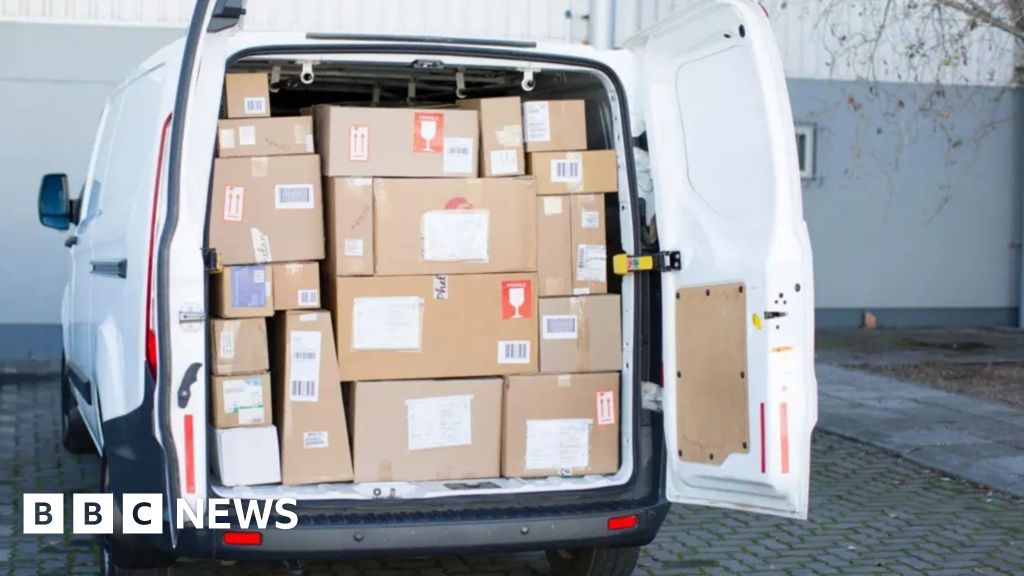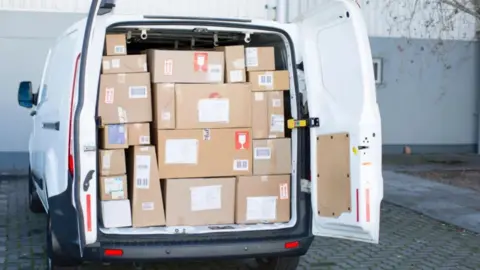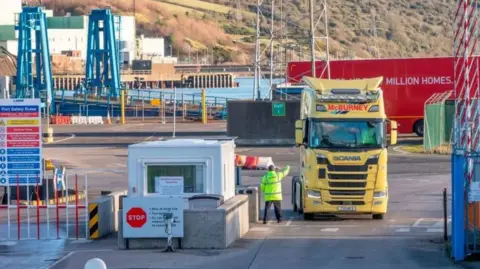Windsor Framework: Some customs processes have been delayed

 Getty Images
Getty ImagesTwo elements of the Windsor Framework which were due to be implemented at the start of the October have been delayed until next year.
The Windsor Framework is the Brexit deal which sets trading rules between Great Britain and Northern Ireland.
New customs processes for parcels and freight have now been delayed until March 2025 at the earliest.
Some businesses had expressed concerns that there had not been enough time to prepare for the changes.
Business-to-business parcels
In a message to traders, HM Revenue and Customs said: “As our ongoing engagement with you has recognised, several events, including the General Election and the pre-election period, have impacted on the preparations of traders and the border industry.
“We recognise that more time will therefore be required to ensure full readiness for the new arrangements.”
It is understood the EU has agreed to the change and this is not the UK acting unilaterally.
The main change which had been planned for October concerned business-to-business parcels.
They were due to face customs processes for the first time while parcel carriers were also supposed to be signed up to a new trusted trader scheme.
Post-Brexit challenges
Parcels have been one of the most difficult post-Brexit trading issues for the UK government to resolve.
After Brexit, Northern Ireland effectively remained in the EU’s single market for goods.
That meant some new checks and controls have been applied to goods being sent from Great Britain to Northern Ireland – which some have described as the Irish Sea border.
This was originally governed by a UK-EU deal known as the Northern Ireland Protocol. It was revised last year and became the Windsor Framework.
Under the original deal most parcels going from Great Britain to Northern Ireland would have required customs declarations: that was never implemented as businesses and the UK government said it would be unworkable.
The Windsor Framework aims to radically simplify the original proposal while also including measures which give the EU assurance that goods will not illicitly enter its market.
However businesses are still concerned.
In August the NI Chamber of Commerce told the BBC that “clarity and an urgent plan” were needed on parcel movements.
 Getty Images
Getty ImagesThe next phase of “Not for EU” food labelling will go ahead in October.
Under the Windsor Framework, UK public health and safety standards, rather than EU standards, apply to food and drink being sold by retailers in Northern Ireland.
That means Great Britain traders who are sending food for sale to Northern Ireland consumers should face few routine checks and minimal paperwork.
The flipside of this is the use of “Not for EU” labels on GB food products, to give assurance to the EU that products will not wrongly be sold in its single market.
In the first phase that labelling was limited to pre-packed meat and fresh milk being sent from Great Britain to Northern Ireland.
From 1 October, all milk and dairy products will need to be individually labelled at product level.
The number of “identity checks” on GB products entering NI will be reduced as a result.
Related
Youth football teams hold minute’s silence for 10-year-old Poppy Atkinson
Youth football teams and grassroots clubs across the country have held a minute’s silence at the start of their games to commemorate a 10-year-old girl who di
Girl’s death sparks minute’s silence at football matches nationwide
10-year-old Poppy Atkinson was killed when she was struck by a car during a training session at Kendal Rugby Club in Cumbria. Clubs from Leeds to London
Liverpool fans’ Uefa claim can be heard in England, judge…
The high court, sitting in Liverpool, heard Uefa had relied upon the principle that English courts will not inquire into the legality of actions by foreign gove
Alan Shearer’s Premier League predictions including Manchester United vs Arsenal
Caption: Alan Shearer?s Premier League predictions credit: Getty / Metro After some impressive results for English sides in Europe the focus is













